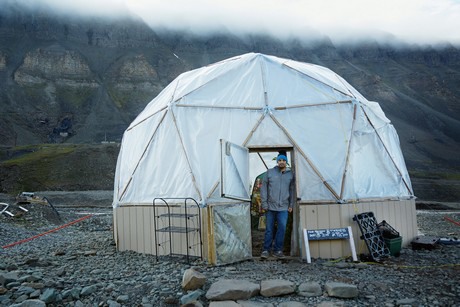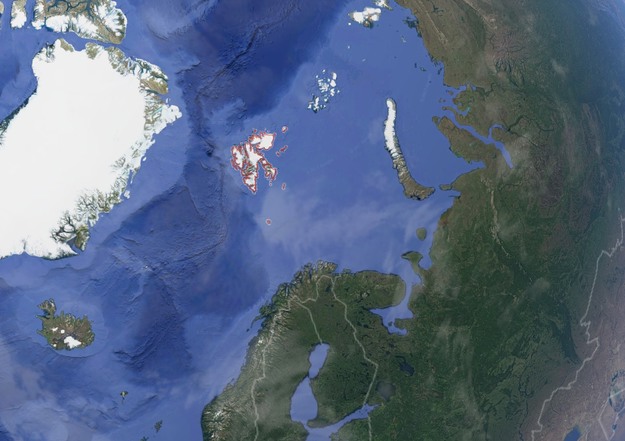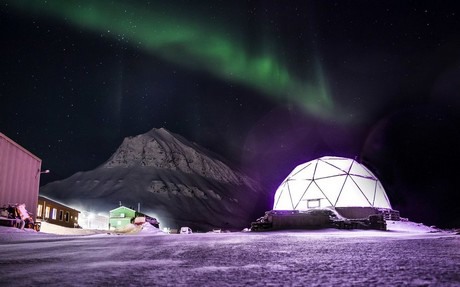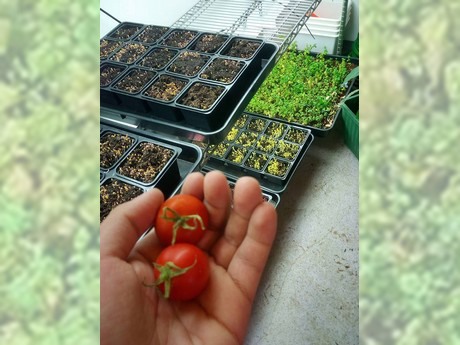
Benjamin grew up in Ohio, in the USA, but moved to Malaysian Borneo, Sabah in 2005. From there he worked as a chef in a restaurant, and a cooking school. After having worked on cruise ships that took him to Antarctica, and then to the Arctic. The company brought him to Longyearbyen, Svalbard to work the summer season there. From there he got a job at the Radisson Polar Hotel back in 2008 and has been there off and on ever since.

Svalbard (outlined in red) is a group of islands in the North Pole, north of the Norway mainland
"Daily life here is extreme," Benjamin says, "and really depends on what time of year it is. During the light season, we have light for 24 hours per day." The busy season for tourism is from February, and it goes until May. "After that, things slow down a bit, and all winter activities such as snowmobiling and dog sledging switch over to boat tours. The sun starts to leave again at the end of September, and then we prepare for the polar night. During that time, it is dark for 24 hours a day."
Circular economy
These harsh conditions make it difficult enough to live, let alone do something like, say, grow food. Still, Benjamin saw potential for growing food on the island, and he started Polar Permaculture Solutions, AS, with the ambition of growing food in a closed-loop system. Describing the project, he says it was started "because of my passion for food, and my quest to find the freshest produce available. I am an eco-chef/foodie, and the most challenging aspect of living here in Svalbard for me has been the food situation. Everything is shipped up, and we pay plenty of money for fresh food because it comes by plane. However, it is much healthier to eat the frozen vegetables as they have more nutrition, and taste than the fresh items that are imported. This project was started to provide fresh produce here on the 'northern most' town and reconnect people back to their farmer."

In the beginning many people thought Benjamin was crazy doing this project, and it actually got popular in Europe before it got popular in town. Now though, many people know about this project, "and the local population is very proud of what we are doing here", Benjamin says. His vision is that ultimately Svalbard will become an example for the world, and develop a circular economy that makes the most use of all available resources.
Seed vault
To gather cultivation knowledge, Benjamin reaches out to many different people around the Arctic, and around the world. "I also try to benchmark what is working well for others, and try to implement it here in our project. YouTube and Google have been my biggest allies..."
And he has a wealth of agricultural knowledge right next door - the Svalbard Global Seed Vault. "They know about us, and are curious about our project. A representative from there has booked a tour with us for all members of their team as they will have a meeting in January, and are curious about what we are up to. I am looking forward to working any and all partners."
Branching out
Benjamin and his colleagues are looking to develop this project, and export systems to help others around the world. "If we can do it here then we can do it anywhere. I already have many people reaching out from all around the world, and I am hoping to get things organized here in order to start helping others. This is our story, and we want to share it with the world."
Benjamin also sees the potential for the project when it comes to reducing food waste. "Most of our clients are the local hotels, and restaurants. Being that I am a chef, I know exactly what is needed, and can focus products, and services to address those needs. All of the local restaurants/hotels here buy from us, and I do not see why others from around the world will not work with us also in the near future."

As for the future, Benjamin says it's looking good. "This is the first year we are positive after two years in business. We will continue to scale up, and work with others to develop better systems, and services. We have many innovations lined up that we will begin testing soon, and will come back with that at a later date."
And if you're interested in spending some time on Svalbard, helping out with the project, they're looking to work with people that have skills in the following areas: mushrooms from coffee grinds, bio gas production, aquaponics, hydroponics, animals, and greenhouse production. Reach out to Benjamin to find out more about his project, using the contact details below.
For more information:
 Polar Permaculture Solutions, AS
Polar Permaculture Solutions, ASinfo@polarpermaculture.com
www.polarpermaculture.com
